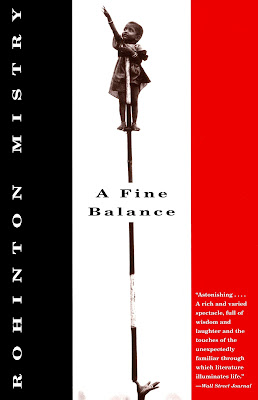Fiction
1995 Vintage Books
Finished on January 16, 2023
Rating: 4/5 (Very Good)
Original Rating: 5/5 (Excellent)
Publisher's Blurb:
The time is 1975. The place is an unnamed city by the sea. The government has just declared a State of Emergency, in whose upheavals four strangers--a spirited widow, a young student uprooted from his idyllic hill station, and two tailors who have fled the caste violence of their native village--will be thrust together, forced to share one cramped apartment and an uncertain future.
As the characters move from distrust to friendship and from friendship to love, A Fine Balance creates an enduring panorama of the human spirit in an inhuman state.
Twenty-five years ago, I read A Fine Balance with an online book group. I remember falling in love with the story and characters, losing myself for hours in Mistry's evocative narrative. I gave the book a 5-star rating and went on to make it one of my favorite recommendations while working at Barnes & Noble. When we moved to Oregon, one of the members in my book group mentioned how much she enjoyed the book, and I encouraged her to nominate it for one of our selections last year. I wasn't able to attend the discussion, but I started reading the novel in September, only to set it aside for a few months. I picked it up again in December and couldn't put it down. Dina, Ishvar, Omprakash (Om, for short), and Maneck, who are so well-drawn and memorable, each worked their way into my heart, warts and all.
After all these years, I'd forgotten so much about the plot and was stunned by the turn of events as the conclusion drew near. I love a big book that pulls me in, invading my thoughts when I'm not reading, but unlike my recent read (Coming Home by Rosamunde Pilcher), this chunkster did not leave me feeling happy and hopeful. A Fine Balance is a heartbreaking story of four individuals who grow to care for one another, creating a non-traditional family within the confines of their small abode, struggling to survive during India's State of Emergency in the 70s. I didn't love this literary novel quite as much as the first time I read it, but it's an enlightening work, worthy of all the accolades and awards.
Highly recommend.




